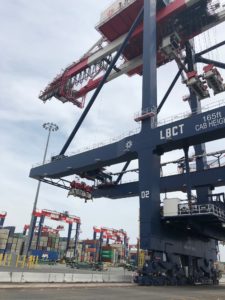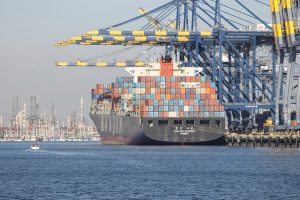
Last week I had the opportunity to tour the world’s first zero-emission marine container terminal at the Port of Long Beach (see photo). The terminal uses fully automated battery electric cargo handling equipment to move containers, with more than 60 lead acid battery electric units running in every day service.
Here is a video I took of the autonomous vehicles, which are pretty mesmerizing to see move on their own:
[youtube https://www.youtube.com/watch?v=z-rJJiKNtLM&w=560&h=315]
The entire project cost well over $1 billion to build and took years to secure all the permitting, according to port officials who led us on the tour. Despite the productivity gains, port leaders seem unlikely to expand the use of the technology anytime soon, given funding constraints.
Still, the terminal is not without controversy. As I blogged about previously, the project led to a battle between labor unions and port officials, as the automations component led to longshoremen layoffs.
Ultimately, as port officials, policy makers, and advocates move toward cleaner freight at the ports, issues such as automation and workforce participation will play a major role in determining the technologies and implementation going forward.
It’s a topic we’ll discuss at the upcoming free UCLA/Berkeley Law conference on June 8th at UCLA on zero-emission freight at Southern California’s ports, featuring a keynote presentation by California Air Resources Board chair Mary Nichols. Sign up today to learn more about this and other issues related to sustainable freight at the ports. MCLE credit available for attorneys. Space is limited!
 A few weeks ago, UC Berkeley Law released the report Delivering the Goods, with recommendations for how California could achieve a more sustainable freight system. Goods movement in the state is a major economic driver but also a significant source of pollution.
A few weeks ago, UC Berkeley Law released the report Delivering the Goods, with recommendations for how California could achieve a more sustainable freight system. Goods movement in the state is a major economic driver but also a significant source of pollution.
To accompany the report release, the Center for Law, Energy and the Environment (CLEE) at Berkeley Law held a webinar to highlight key findings. The discussion featured these experts:
- Elizabeth Fretheim of Walmart
- Adrian Martinez of Earthjustice
- Chris Schmidt of Caltrans
Video from the webinar is now available, for those who couldn’t attend at the time or would like to review portions:
And if you’d like to learn more about sustainable freight at Southern California’s ports, please register for the free June 8th conference at UCLA on the prospects for deploying zero-emission technologies there, featuring experts from industry, government and advocacy groups.
 The Ports of Los Angeles and Long Beach bring more goods into the U.S. than any other ports in the country. Yet together the ports are the single largest source of air pollution in Southern California.
The Ports of Los Angeles and Long Beach bring more goods into the U.S. than any other ports in the country. Yet together the ports are the single largest source of air pollution in Southern California.
Harbor commissioners have adopted an ambitious plan to transition to cleaner fuels for goods movement in and around the ports in the next two decades. But achieving the vision for clean air will require answers to important questions:
- What are the prospects and potential for various zero-emission technologies – including battery electrification – to reduce pollution?
- How can finance, permitting and community engagement support the transition to cleaner fuels?
- What new policy and industry actions are needed for cost-effective deployment?
To address these questions, UCLA Law and UC Berkeley Law, with sponsorship from Bank of America, are hosting a free, daylong conference at UCLA Covel Commons on June 8, 2018. Panelists will examine the prospects and policy needs to move to a zero-emission future of goods movement in and around the ports. Speakers include the president of BYD Motors, CEO of ProTerra, CEO of Total Transportation Services, Inc. (TTSI) and CEO of the Coalition for Clean Air.
Also included will be representatives from:
- Bank of America
- California Trucking Association
- Earthjustice
- Port of Long Beach
- Southern California Edison
- Tesla Motors
- Union of Concerned Scientists
They will focus on steps that industry, government and civil society leaders must take to achieve zero-emission goods movement at the ports.
The event is free and open to the public, but advance registration is required, as space is limited. Please see the agenda and registration for more information.
Hope to see you there!
 California’s freight system is massive. Nearly 1/3 of all jobs in the state are in freight-related fields, and nearly 40% of all cargo moved throughout the United States enters or originates in California. The state’s seaports, airports, international border crossings and thousands of miles of rails and roads are integral to not just the state but the local, national and international economies.
California’s freight system is massive. Nearly 1/3 of all jobs in the state are in freight-related fields, and nearly 40% of all cargo moved throughout the United States enters or originates in California. The state’s seaports, airports, international border crossings and thousands of miles of rails and roads are integral to not just the state but the local, national and international economies.
However, the ships, trains, trucks and equipment that move goods throughout California are also responsible for up to 50% of the most harmful air pollutant emissions and 6% of greenhouse gas emissions statewide.
In response to environmental and public health concerns, Berkeley Law’s Center for Law, Energy and the Environment (CLEE) is today releasing a report that details key barriers and priority solutions to making freight more sustainable. Delivering the Goods was informed by a CLEE-convened discussion last July with a group of state regulators, industry leaders and environmental advocates. The group focused on how to achieve the state’s sustainable freight vision.
CLEE is hosting a webinar at 10 am Pacific today with three freight system experts who will discuss the report’s key findings.
Among the top barriers the group identified were the need to:
- Increase local community buy-in for new freight-related infrastructure projects and new technologies;
- Construct more infrastructure supporting smart goods movement; and
- Facilitate sharing of data among industry members and regulators.
The report discusses a broad range of near-term and long-term solutions to these challenges, including recommendations for state leaders, industry participants and community groups. Such actions include:
- Transportation corridor management strategies, such as new vehicle charging stations, freight-dedicated highway lanes and dynamic lane management to facilitate deployment of efficient technologies like heavy-duty truck electrification and platooning;
- Public-private information sharing platforms that encourage member organizations to share and analyze common efficiency-related data while protecting valuable IP, which could inform comprehensive “sliver” pilot programs to track each good’s path from production to consumption and identify efficiency opportunities throughout the supply chain; and
- Expansion of workforce development initiatives, and high school and college supply chain management and logistics programs, to ensure that freight projects are linked to local economies.
Ultimately, developing the state’s future sustainable freight system will depend on sustained efforts by all stakeholders to increase community involvement and support, embrace and effectively regulate emerging technologies, fund and build supportive infrastructure, and collect and disseminate more data. An integrated, collaborative planning and policymaking process, discussed in detail in the report, will be essential to the success of these efforts.
The full report, available here, includes a complete discussion of these concepts and more solutions proposed by the expert group.
CLEE’s free webinar, starting at 10 am Pacific today, can be accessed here. Speakers include:
- Elizabeth Fretheim of Walmart
- Adrian Martinez of Earthjustice
- Chris Schmidt of Caltrans
Hope you can join us!


